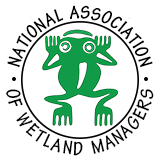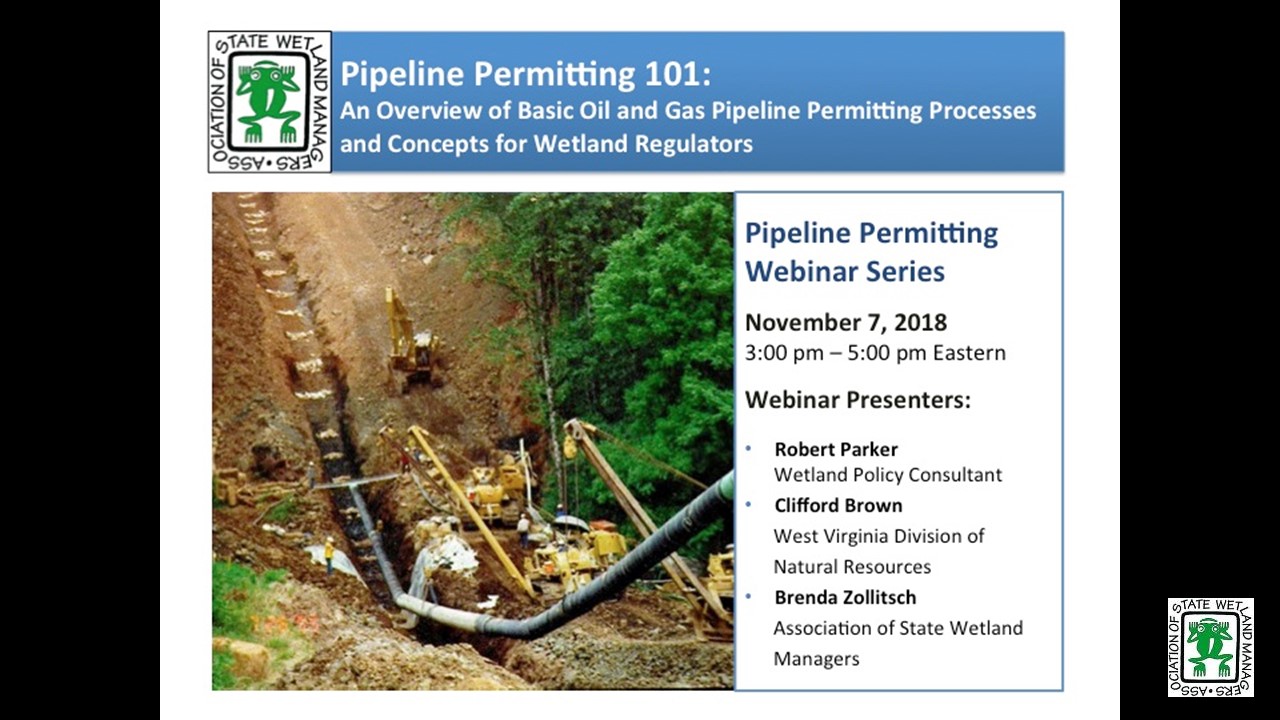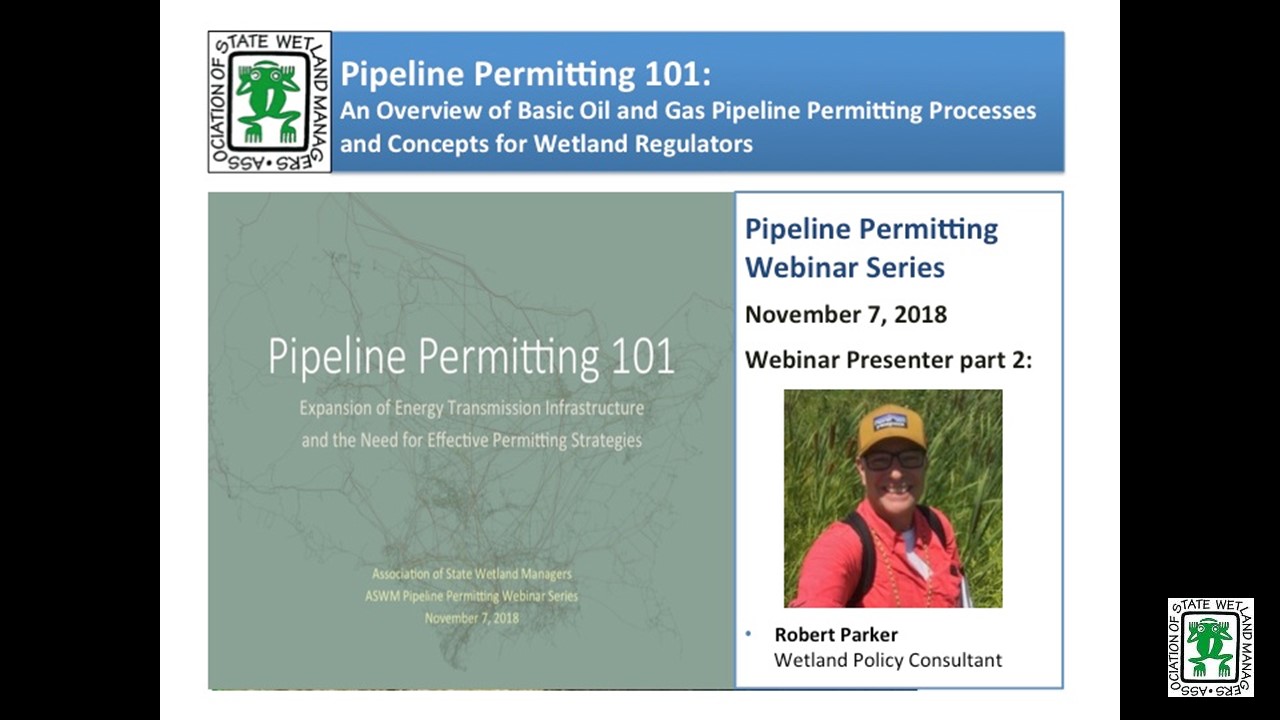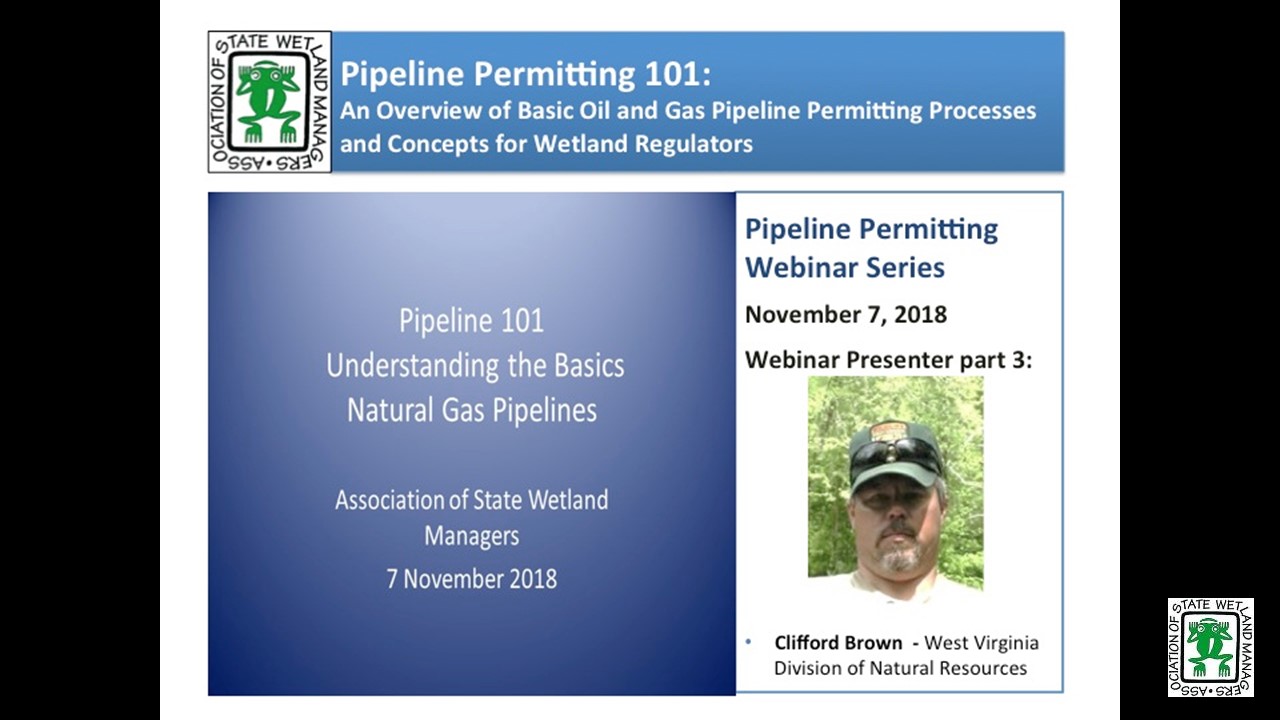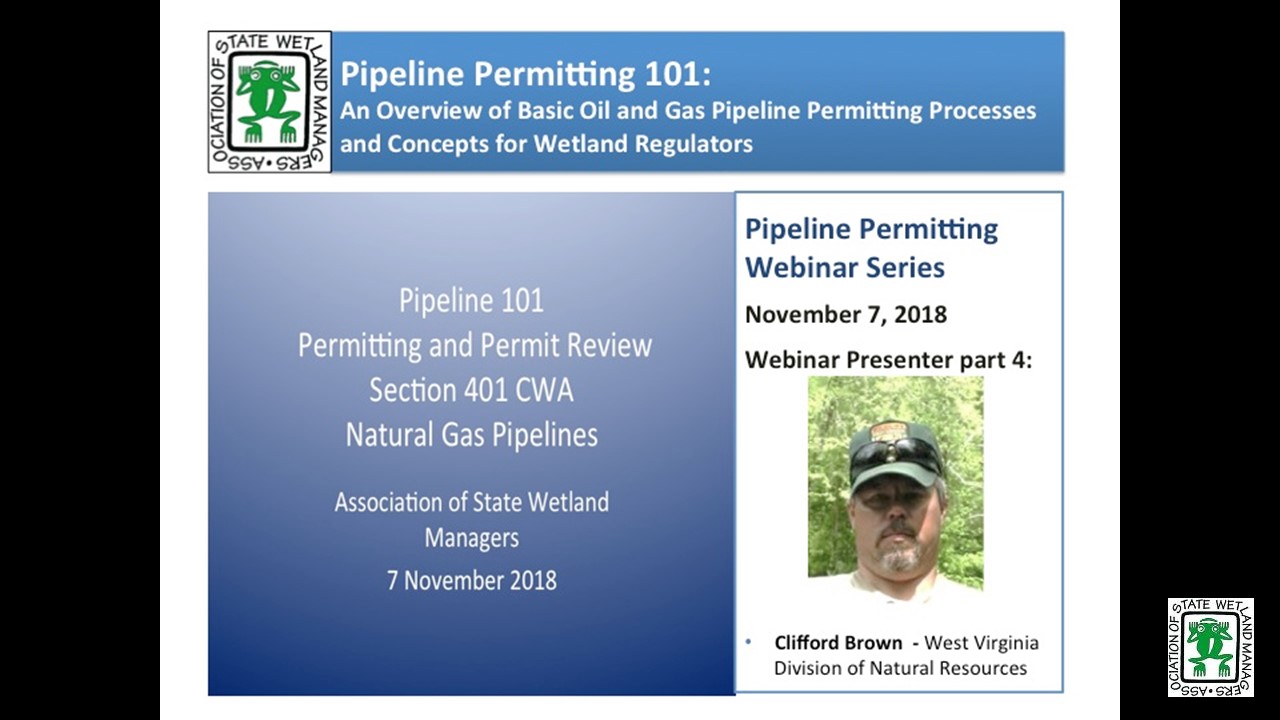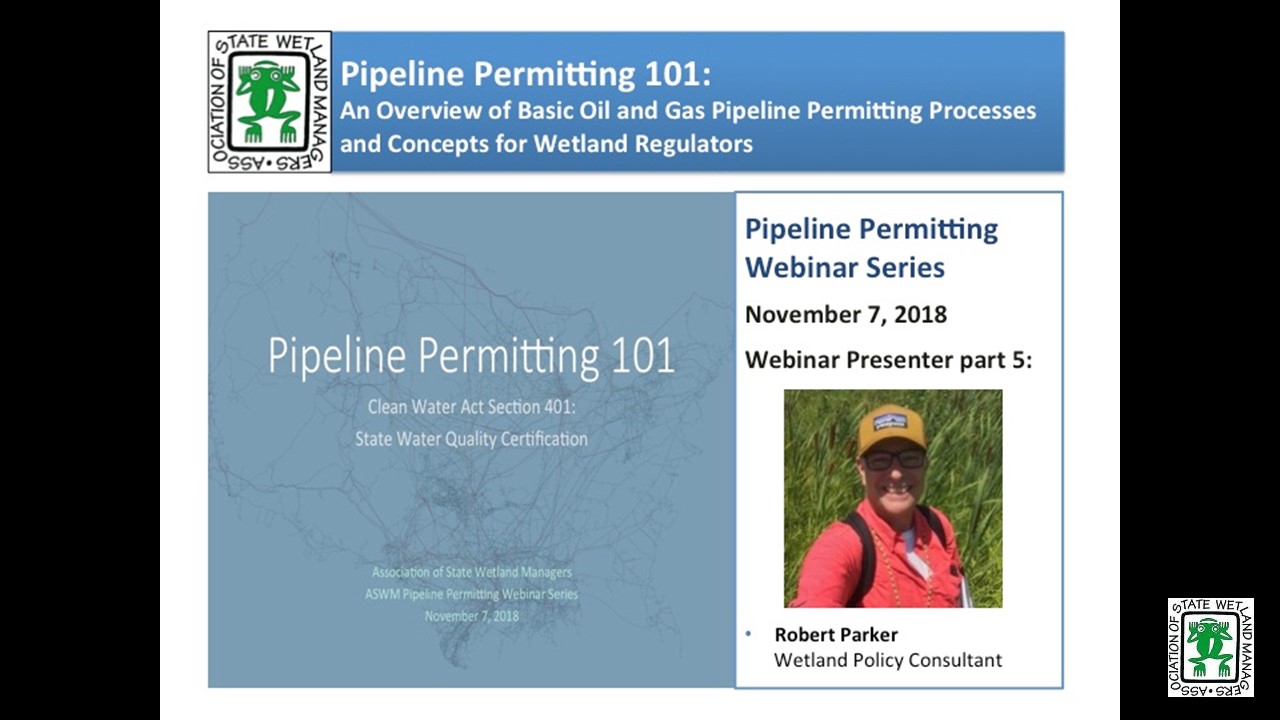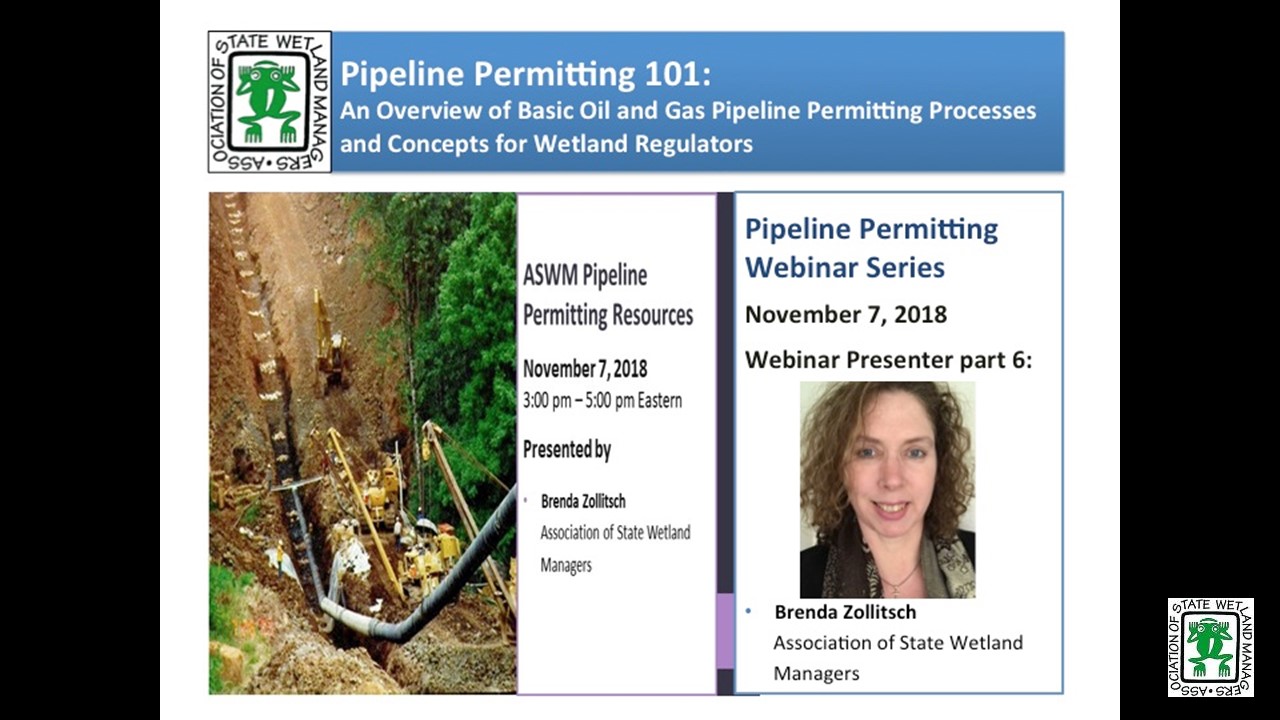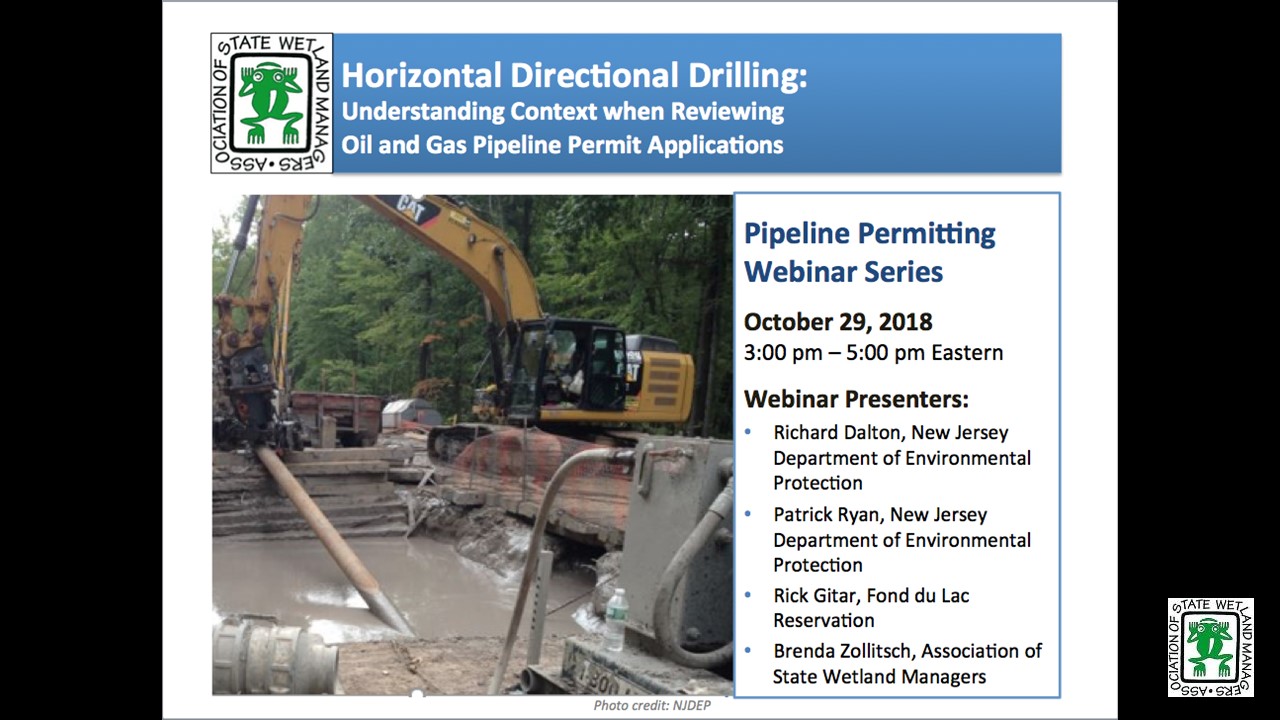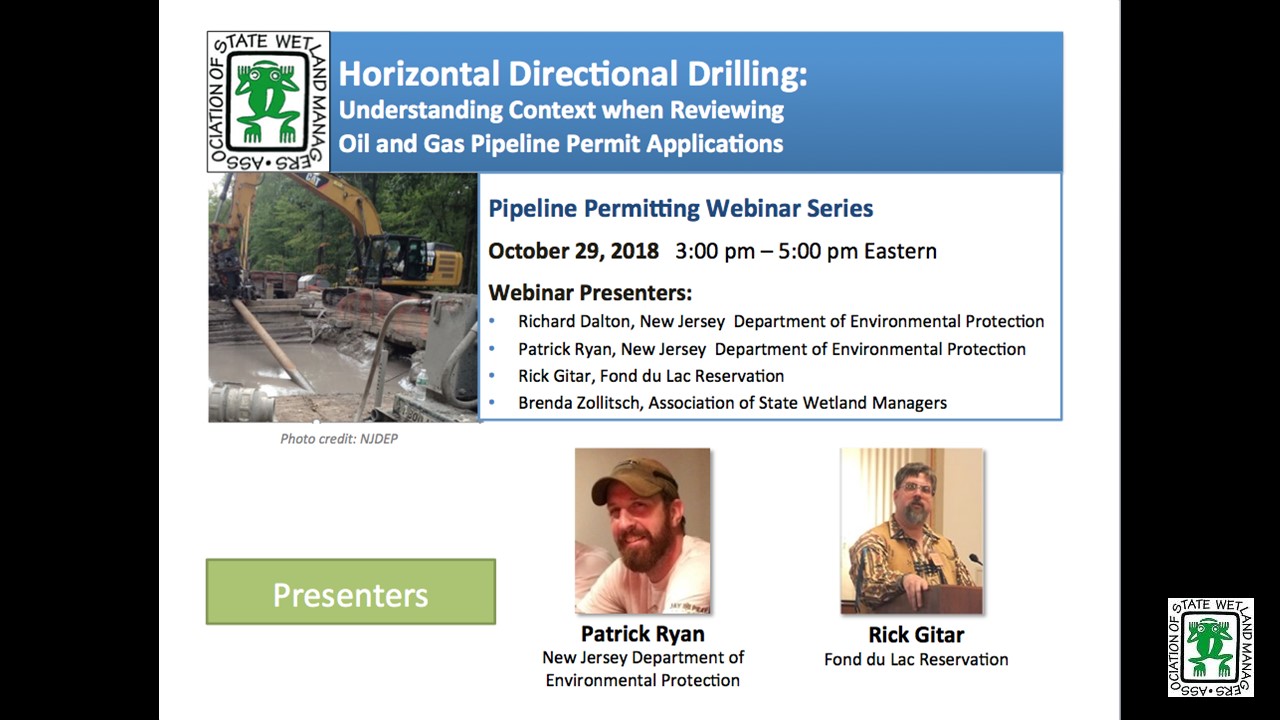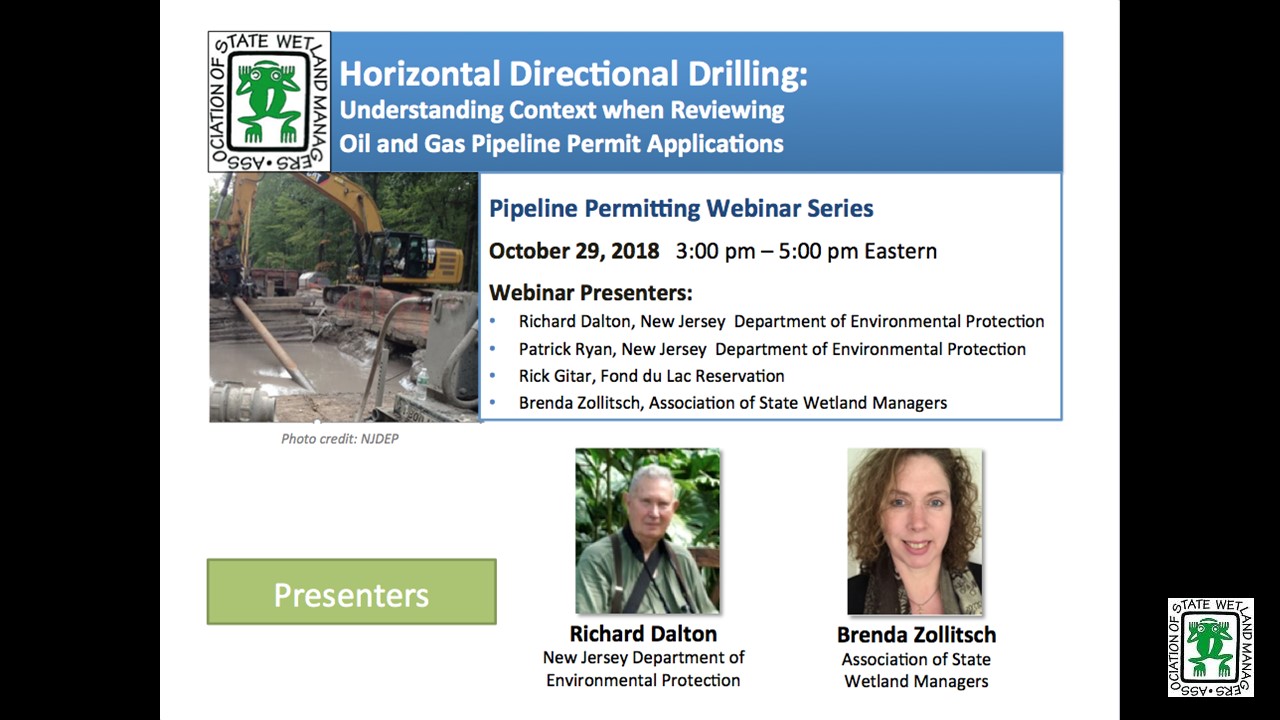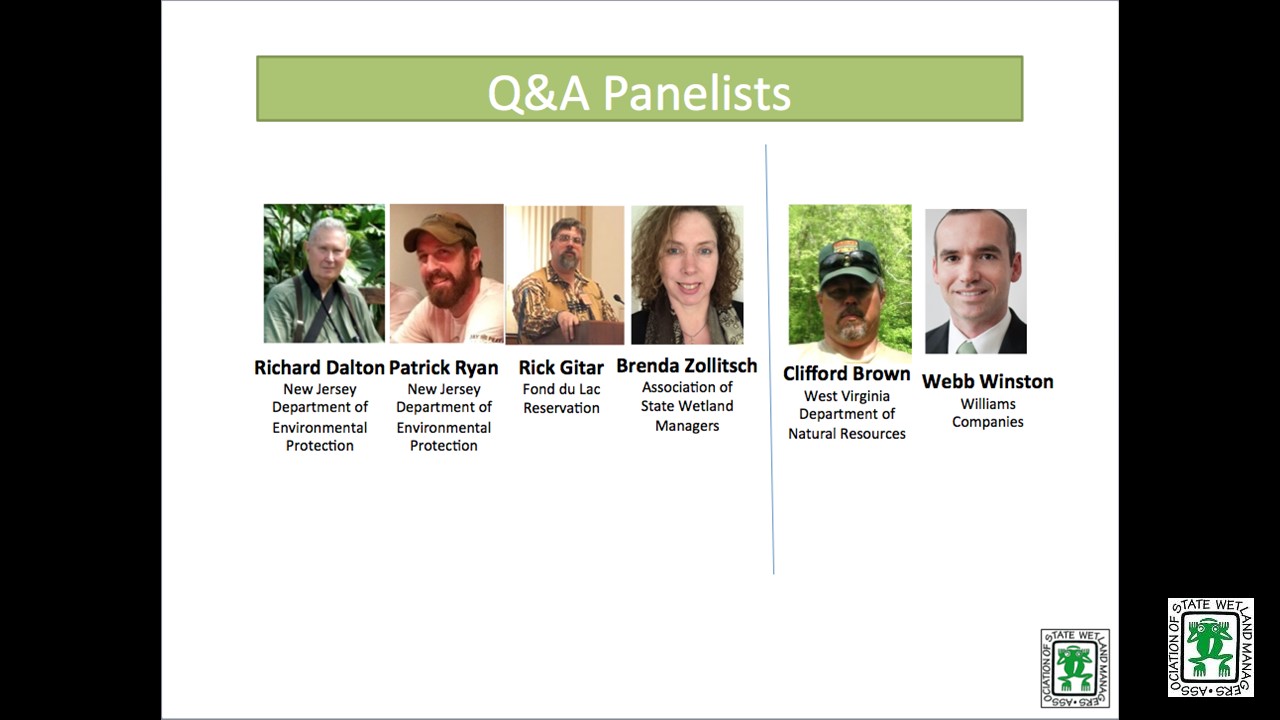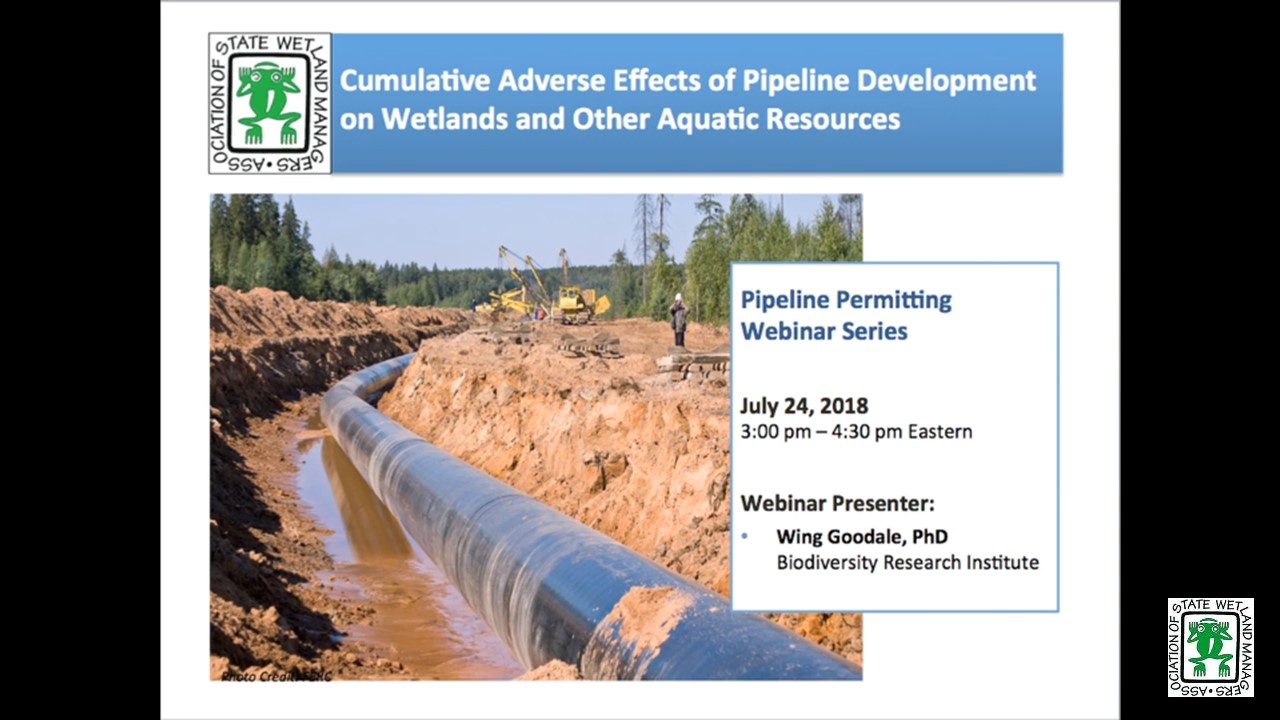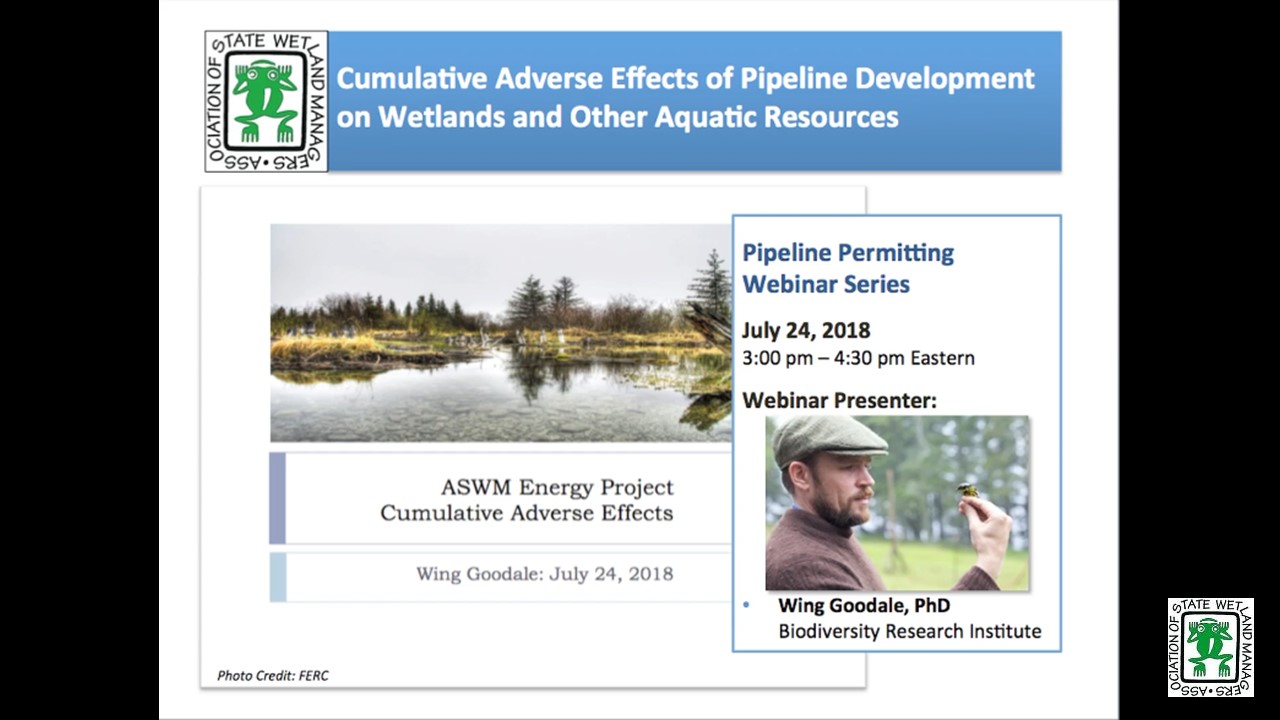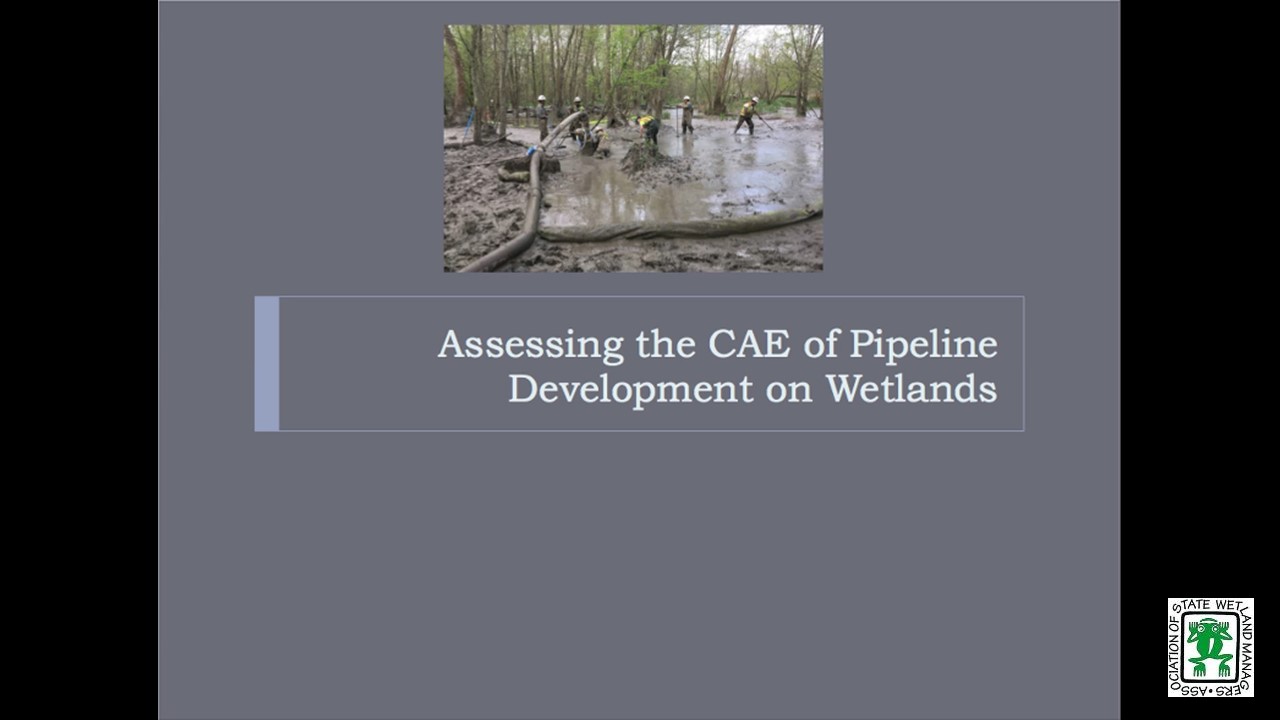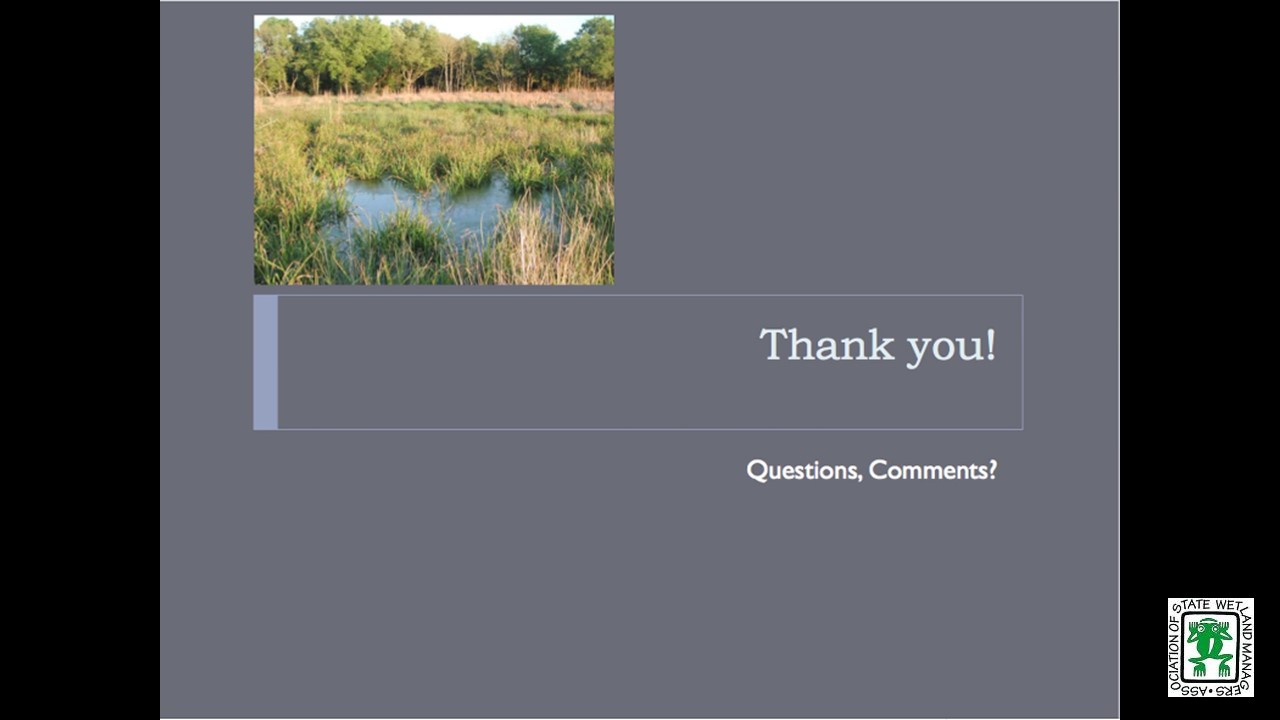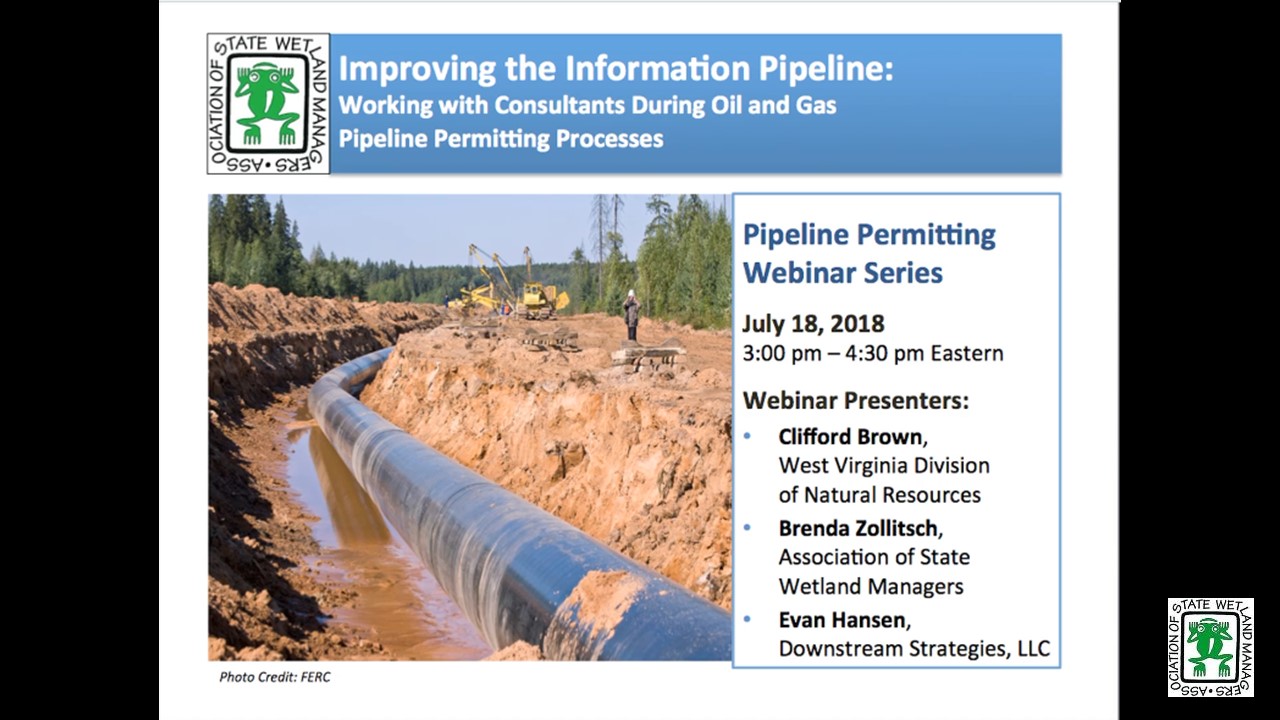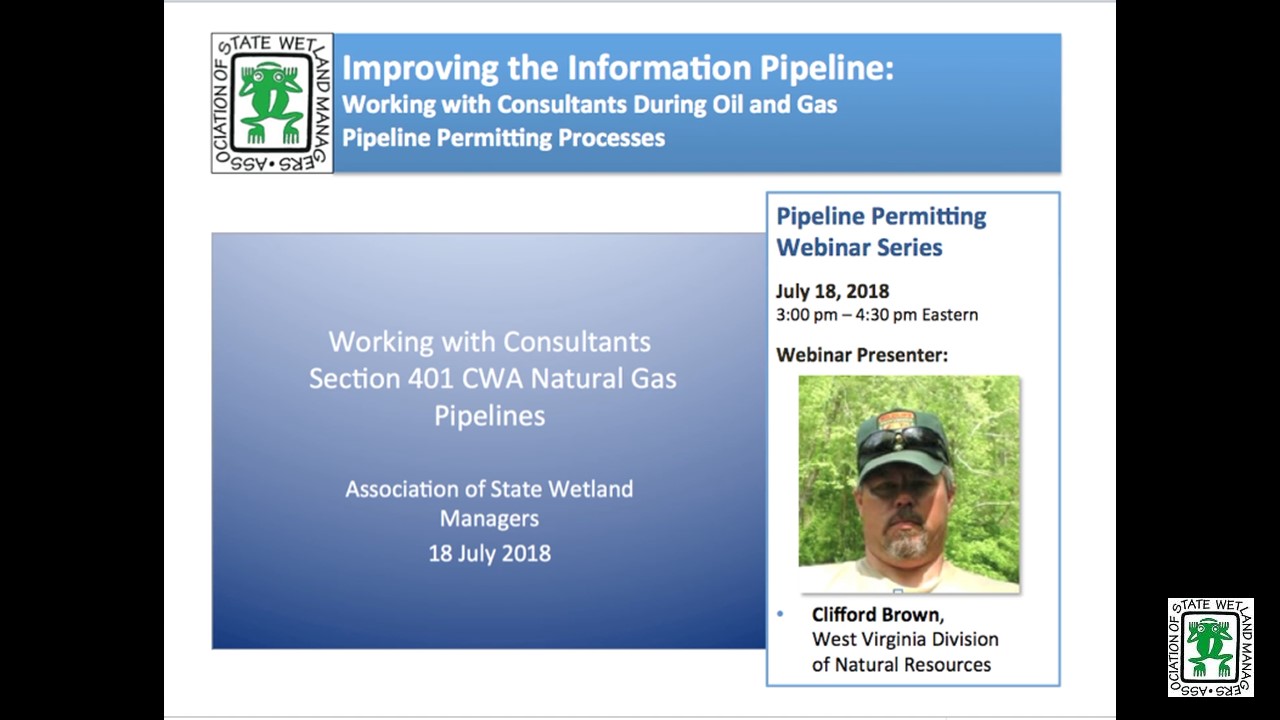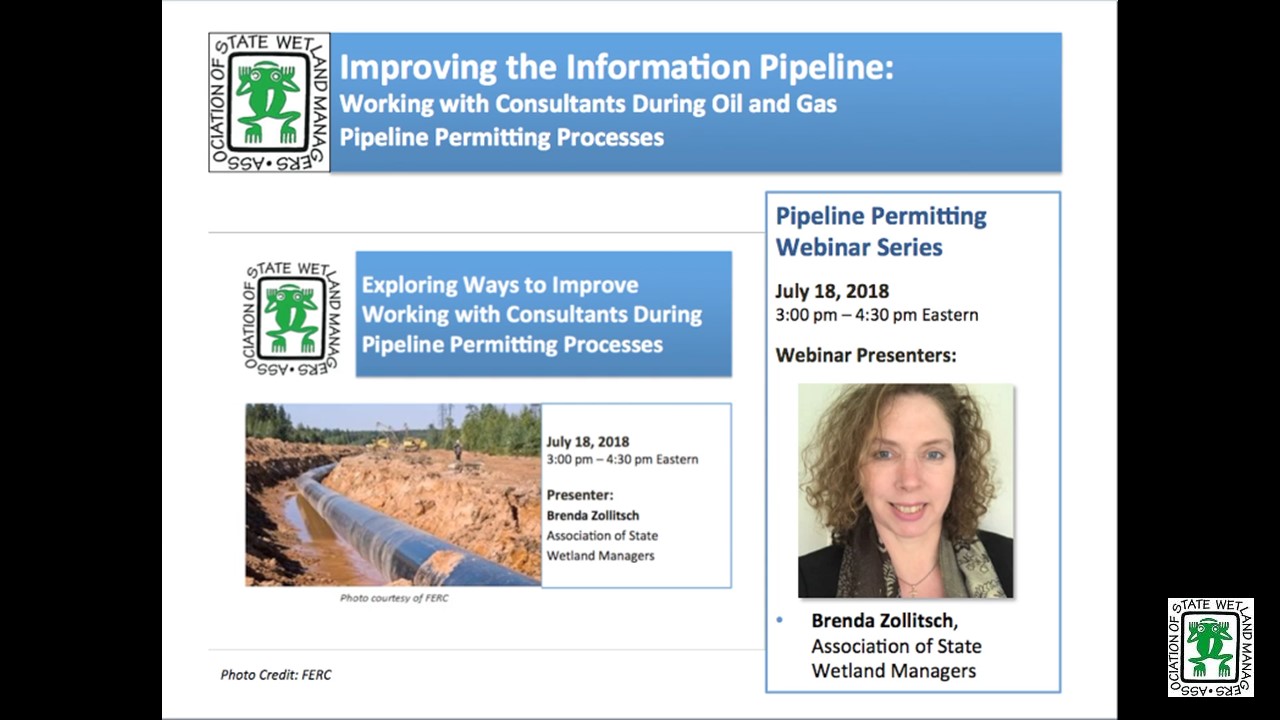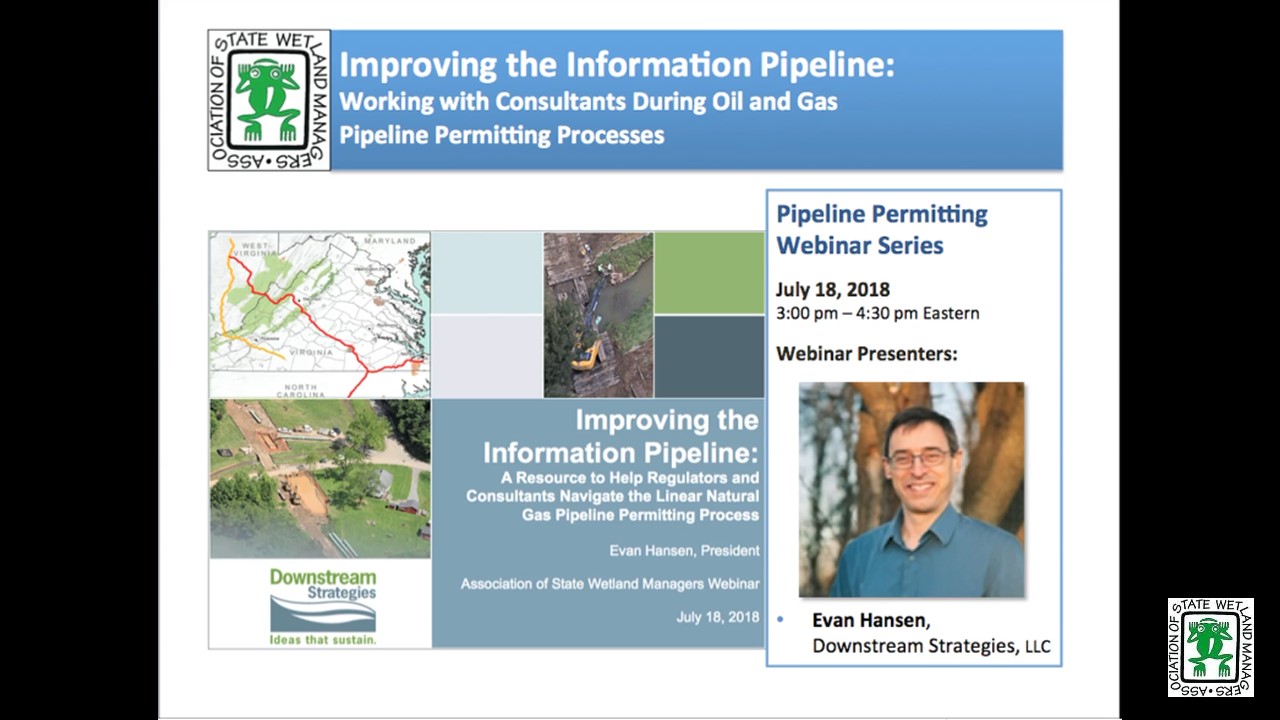NAWM Webinars/Conference Schedule
Webinar #4: Pipeline Permitting 101
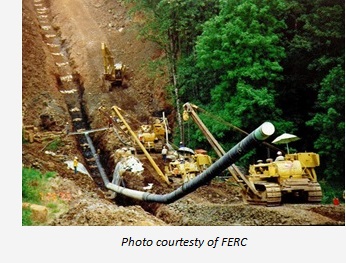
Held Wednesday, November 7, 2018 – 3-5 pm ET
INTRODUCTION
- Brenda Zollitsch, Policy Analyst, Association of State Wetland Managers [PowerPoint Presentation]
PRESENTERS
- Clifford Brown, West Virginia Division of Natural Resources [Presentation #1: PowerPoint Presentation] [Presentation #2: PowerPoint Presentation]
- Robert Parker, Consultant [Presentation #1: PowerPoint Presentation] [Presentation #2: PowerPoint Presentation]
- Brenda Zollitsch, Association of State Wetland Managers [PowerPoint Presentation]
ABSTRACT
This webinar has been designed to help provide a basic overview for regulators that are new to oil and natural gas pipeline permitting and provide a review for others who already are engaged in this work. The webinar began with an overview of the expansion of oil and especially gas pipeline development in recent years and the associated growing need for review of pipeline permit applications by state and tribal aquatic resource regulators. The webinar covered pipeline basics – how pipeline projects are planned, the general steps in construction, and the potential to participate in a pre-application phase during which many key planning decisions are made. The webinar discussed the different processes involved in oil and gas permitting. Next, the webinar providef an overview of §401 Water Quality Certification and where this review process fits into overall planning and permitting. The webinar discussed examples of how states and tribes have dealt with conditioning §401 certifications and share lessons learned. The webinar concluded by describing new resources designed for those working on pipeline permitting that will soon be available on the Association of State Wetland Managers’ website.
BIOS
 Clifford Brown has worked for West Virginia Division of Natural Resources, Wildlife Resources Section, since 1989 and currently serves in the DNR Environmental Coordination Unit as the lead for oil and gas related activities. Responsibilities include review of Section 401 applications, coordination with WVDEP and USEPA for mitigation and restoration associated with administrative orders and consent decrees, coordination with USFWS related to the National Wildlife Refuge System, Section 7 of the Endangered Species Act, Migratory Bird Treaty Act and the Wildlife and Sport Fish Restoration Program, coordination with the USFS for oil and gas projects on the Monongahela, George Washington and Jefferson National Forests in West Virginia, and serves on the AFWA Energy and Wildlife Policy Committee and the agency coordinator for review of FERC projects in West Virginia. He holds a B.S. in Biology and a M.S. in Wildlife and Fisheries Science from the Pennsylvania State University.
Clifford Brown has worked for West Virginia Division of Natural Resources, Wildlife Resources Section, since 1989 and currently serves in the DNR Environmental Coordination Unit as the lead for oil and gas related activities. Responsibilities include review of Section 401 applications, coordination with WVDEP and USEPA for mitigation and restoration associated with administrative orders and consent decrees, coordination with USFWS related to the National Wildlife Refuge System, Section 7 of the Endangered Species Act, Migratory Bird Treaty Act and the Wildlife and Sport Fish Restoration Program, coordination with the USFS for oil and gas projects on the Monongahela, George Washington and Jefferson National Forests in West Virginia, and serves on the AFWA Energy and Wildlife Policy Committee and the agency coordinator for review of FERC projects in West Virginia. He holds a B.S. in Biology and a M.S. in Wildlife and Fisheries Science from the Pennsylvania State University.
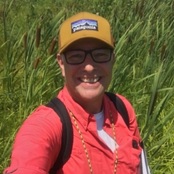 Robert Parker has worked in state government, nonprofits and consulting firms, developing a critical breadth of knowledge about the regulatory process from many perspectives. He is the former Section 401 Coordinator at Nebraska Department of Environmental Quality (NDEQ) and currently works as a independent consultant. While at NDEQ Robert also coordinated the state’s Storm Water Management Plan Grants Program and served as project manager for Watershed Management Plans in development by Nebraska Natural Resources Districts under the state's Nonpoint Source Management Plan. Before relocating to the Great Plains, Robert worked in the Great Basin region with threatened Lahontan cutthroat trout. He has a B.S. in Fisheries Biology from Humboldt State University, where he completed undergraduate research in genetic and morphologic differentiation in isolated populations of rough sculpin (Cottus asperrimus) in California’s Pit and Fall Rivers. Prior to his career in science and policy Robert spent nearly two decades working as a professional whitewater and fly fishing guide in Alaska, California, Montana, and Chile.
Robert Parker has worked in state government, nonprofits and consulting firms, developing a critical breadth of knowledge about the regulatory process from many perspectives. He is the former Section 401 Coordinator at Nebraska Department of Environmental Quality (NDEQ) and currently works as a independent consultant. While at NDEQ Robert also coordinated the state’s Storm Water Management Plan Grants Program and served as project manager for Watershed Management Plans in development by Nebraska Natural Resources Districts under the state's Nonpoint Source Management Plan. Before relocating to the Great Plains, Robert worked in the Great Basin region with threatened Lahontan cutthroat trout. He has a B.S. in Fisheries Biology from Humboldt State University, where he completed undergraduate research in genetic and morphologic differentiation in isolated populations of rough sculpin (Cottus asperrimus) in California’s Pit and Fall Rivers. Prior to his career in science and policy Robert spent nearly two decades working as a professional whitewater and fly fishing guide in Alaska, California, Montana, and Chile.
 Brenda Zollitsch, PhD is Policy Analyst at the Association of State Wetland Managers, leading ASWM’s research on wetland and stream issues. She has been the PI on an ongoing multi-year project exploring ways to increase the effectiveness and efficiency of state and tribal permitting of oil and gas pipeline projects. In addition to her work for ASWM, Brenda serves as adjunct faculty at the University of Southern Maine’s Muskie School of Public Service teaching courses in public policy. She also assists water resource collaborations as a strategic planner and professional facilitator. Brenda holds her PhD in Public Policy from the University of Southern Maine’s Muskie School of Public Service and a double Masters’ degree in International Relations and Environmental Resource Management from Boston University.
Brenda Zollitsch, PhD is Policy Analyst at the Association of State Wetland Managers, leading ASWM’s research on wetland and stream issues. She has been the PI on an ongoing multi-year project exploring ways to increase the effectiveness and efficiency of state and tribal permitting of oil and gas pipeline projects. In addition to her work for ASWM, Brenda serves as adjunct faculty at the University of Southern Maine’s Muskie School of Public Service teaching courses in public policy. She also assists water resource collaborations as a strategic planner and professional facilitator. Brenda holds her PhD in Public Policy from the University of Southern Maine’s Muskie School of Public Service and a double Masters’ degree in International Relations and Environmental Resource Management from Boston University.
![]()
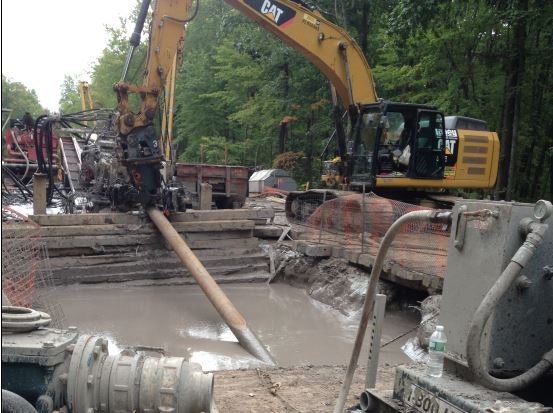
Webinar #3: Horizontal Directional Drilling: Understanding Context when Reviewing Oil and Gas Pipeline Permit Applications
Held Monday, October 29, 2018 – 3-5 pm ET
INTRODUCTION
- Brenda Zollitsch, Policy Analyst, Association of State Wetland Managers [PowerPoint Presentation]
PRESENTERS
- Richard Dalton, New Jersey Department of Environmental Protection [PowerPoint Presentation]
- Patrick Ryan, New Jersey Department of Environmental Protection [PowerPoint Presentation]
- Rick Gitar, Fond du Lac Reservation [PowerPoint Presentation]
- Brenda Zollitsch, Association of State Wetland Managers [PowerPoint Presentation]
ABSTRACT
Horizontal Directional Drilling (HDD) is often considered a best practice for pipeline construction. However, in practice, HDD is only appropriate in certain contexts. This webinar started with a geology primer identifying contexts where HDD both commonly works and does not work well and why. Next, the state and tribal regulators shared their perspectives on reviewing permits that include HDD and some of their lessons learned. They shared the kinds of information that it is beneficial for reviewers to request and common considerations when reviewing and conditioning permit applications that include proposed HDD. Alternatives to HDD and their strengths and weaknesses also was discussed. The webinar concluded with information about new resources for those working on pipeline permitting efforts that will soon be available on the Association of State Wetland Managers’ website.
BIOS
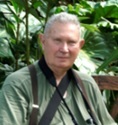 Richard Dalton is a Geologist and Manager for the Office of the State Geologist in the Division of Water Supply and Geoscience at the New Jersey Department of Environmental Protection. He started with the Bureau of Geology and Topography in spring of 1967 where he was involved mapping the limestone and dolomite geology of northwestern New Jersey. He spent six years doing spill response of oil and hazardous chemicals, then was moved back to the New Jersey Geological Survey where he works in the Office of the State Geologist today. He is also a member of the New Jersey Well Drilled and Pump Installers Licensing Board. He holds a BA in geology from Rutgers University.
Richard Dalton is a Geologist and Manager for the Office of the State Geologist in the Division of Water Supply and Geoscience at the New Jersey Department of Environmental Protection. He started with the Bureau of Geology and Topography in spring of 1967 where he was involved mapping the limestone and dolomite geology of northwestern New Jersey. He spent six years doing spill response of oil and hazardous chemicals, then was moved back to the New Jersey Geological Survey where he works in the Office of the State Geologist today. He is also a member of the New Jersey Well Drilled and Pump Installers Licensing Board. He holds a BA in geology from Rutgers University.
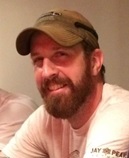 Patrick Ryan is an Environmental Supervisor within the Division of Land Use Regulation at the New Jersey Department of Environmental Protection. He supervises a permitting staff responsible for environmental reviews of wetlands, highlands, waterfront, and flood hazard area permit applications for northern New Jersey. Mr. Ryan has a M.S. in Ecology from Penn State University and a B.S. in Natural Resource Management from Cook College, Rutgers University.
Patrick Ryan is an Environmental Supervisor within the Division of Land Use Regulation at the New Jersey Department of Environmental Protection. He supervises a permitting staff responsible for environmental reviews of wetlands, highlands, waterfront, and flood hazard area permit applications for northern New Jersey. Mr. Ryan has a M.S. in Ecology from Penn State University and a B.S. in Natural Resource Management from Cook College, Rutgers University.
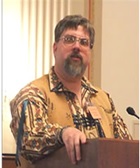 Rick Gitar is the Water Regulatory Specialist and Tribal Inspector for the Fond du Lac Reservation – Office of Water Protection, located in northeast Minnesota, where he has worked for over 20 years. He is the administer of Fond du Lac’s Wetlands Protection and Management Ordinance, their Clean Water Act 401 Water Quality Certification program, and provides CWA Section 402 oversight for projects on the Reservation. Rick is also a credentialed inspector for EPA, conducting compliance inspections in the areas of wetlands and storm water. He conducts Fond du Lac’s environmental reviews under NEPA and the tribe’s Tribal Environmental Policy Act Ordinance. Rick received a double major B.S. in Biology (Botany Focus) and Journalism from the University of Wisconsin – Superior and a M.S. in Environmental Biology (Botany Focus) from the University of Minnesota – Duluth. Rick is also a Master Herbalist and teaches adult extension classes. He is currently enrolled in the online Doctorate of Herbal Medicine Program with AMNAH College.
Rick Gitar is the Water Regulatory Specialist and Tribal Inspector for the Fond du Lac Reservation – Office of Water Protection, located in northeast Minnesota, where he has worked for over 20 years. He is the administer of Fond du Lac’s Wetlands Protection and Management Ordinance, their Clean Water Act 401 Water Quality Certification program, and provides CWA Section 402 oversight for projects on the Reservation. Rick is also a credentialed inspector for EPA, conducting compliance inspections in the areas of wetlands and storm water. He conducts Fond du Lac’s environmental reviews under NEPA and the tribe’s Tribal Environmental Policy Act Ordinance. Rick received a double major B.S. in Biology (Botany Focus) and Journalism from the University of Wisconsin – Superior and a M.S. in Environmental Biology (Botany Focus) from the University of Minnesota – Duluth. Rick is also a Master Herbalist and teaches adult extension classes. He is currently enrolled in the online Doctorate of Herbal Medicine Program with AMNAH College.
 Brenda Zollitsch, PhD is Policy Analyst at the Association of State Wetland Managers, leading ASWM’s research on wetland and stream issues. She has been the PI on an ongoing multi-year project exploring ways to increase the effectiveness and efficiency of state and tribal permitting of oil and gas pipeline projects. In addition to her work for ASWM, Brenda serves as adjunct faculty at the University of Southern Maine’s Muskie School of Public Service teaching courses in public policy. She also assists water resource collaborations as a strategic planner and professional facilitator. Brenda holds her PhD in Public Policy from the University of Southern Maine’s Muskie School of Public Service and a double Masters’ degree in International Relations and Environmental Resource Management from Boston University.
Brenda Zollitsch, PhD is Policy Analyst at the Association of State Wetland Managers, leading ASWM’s research on wetland and stream issues. She has been the PI on an ongoing multi-year project exploring ways to increase the effectiveness and efficiency of state and tribal permitting of oil and gas pipeline projects. In addition to her work for ASWM, Brenda serves as adjunct faculty at the University of Southern Maine’s Muskie School of Public Service teaching courses in public policy. She also assists water resource collaborations as a strategic planner and professional facilitator. Brenda holds her PhD in Public Policy from the University of Southern Maine’s Muskie School of Public Service and a double Masters’ degree in International Relations and Environmental Resource Management from Boston University.
 Webinar #2: Cumulative Adverse Effects of Pipeline Development on Wetlands and Other Aquatic Resources
Webinar #2: Cumulative Adverse Effects of Pipeline Development on Wetlands and Other Aquatic Resources
Held Tuesday, July 24, 2018 at 3 pm ET
INTRODUCTION
- Brenda Zollitsch, Policy Analyst, Association of State Wetland Managers [PowerPoint Presentation]
- Webinar Series Information [PowerPoint Presentation]
PRESENTER
- Wing Goodale, Biodiversity Research Institute [PowerPoint Presentation]
ABSTRACT
Energy projects, particularly pipelines, affect a range of aquatic resources, including wetlands. Impacts to wetlands from pipeline activities range from both short- and long-term destruction and disruption of wetlands and other aquatic resources to water quality impacts, habitat loss, increasing invasive species and compromised quality of critical areas. The adverse effects of a pipeline on a single wetland are important, but of equal or greater concern is the effect of pipelines that cross multiple watersheds and multiple wetlands. A single pipeline can cross hundreds of wetlands and streams, which can lead to cumulative adverse effects (CAE).
This webinar provided an introduction about how CAE can be conceptualized, the language used to discuss CAE, and the legal basis for CAE. The presentation discussed a framework for considering adverse effects, including a review of general approaches for CAE assessments and ways to address these effects. The webinar concluded with the presentation of a thought-provoking approach to conducting simple assessment of CAE that could be adapted for use by wetland professionals as they work to identify and address CAE for projects they are planning and/or permits they are reviewing. The webinar ended with information about the Association of State Wetland Managers’ recent pipeline permitting project and forthcoming resources on CAE that will be available on ASWM’s website.
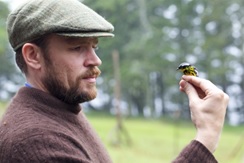 BIO
BIO
Wing Goodale is Senior Deputy Director for the Center for Ecology & Conservation Research and Director for the Biodiversity Research Institute (BRI) in Maine. He is a NSF IGERT fellow in the UMass Offshore Wind Energy Program. Goodale has worked at BRI since 2000 and is now the deputy director. At BRI, he has raised or helped manage over $7.5 million of funds for more than 60 conservation biology projects. Goodale has served on municipal committees, environmental nonprofit boards, professional boards, and college boards, including the governor appointed Maine Board of Environmental Protection. Wing is a Ph.D. Candidate in the Department of Environmental Conservation at University of Massachusetts, Amherst. He also has his Master of Philosophy in Human Ecology from the College of the Atlantic and his Bachelor of Arts in Biology from Colorado College.
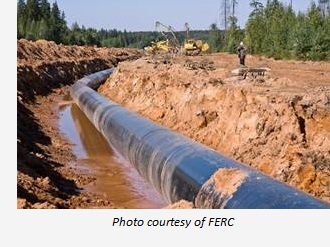 Webinar #1: Improving the Information Pipeline: Working with Consultants During Oil and Gas Pipeline Permitting Processes
Webinar #1: Improving the Information Pipeline: Working with Consultants During Oil and Gas Pipeline Permitting Processes
Held Wednesday, July 18, 2018 at 3 pm ET
INTRODUCTION
- Brenda Zollitsch, Policy Analyst, Association of State Wetland Managers [PowerPoint Presentation]
PRESENTERS
- Clifford Brown, West Virginia Department of Natural Resources [PowerPoint Presentation]
- Brenda Zollitsch, Association of State Wetland Managers [PowerPoint Presentation]
- Evan Hansen, Downstream Strategies, LLC [PowerPoint Presentation]
ABSTRACT
This webinar provided insights about how wetland and other aquatic resource regulators can improve working relationships with consultants who serve as intermediaries for energy companies working on oil and gas pipeline development projects. This webinar shared insights from state permit reviewers on some of the common challenges, ranging from different understandings of permitting processes, points of access, pipeline terms and use of language. The webinar discussed helpful ways of working together to establish common understanding, share key concerns about impacts to aquatic resources and incorporate best practices to address those impacts. The webinar presented a new resource developed by ASWM to help guide more productive conversations and relationships between regulators and consultants, focusing on creating transparency, common understandings, and strong relationships that facilitate both efficient permit review processes and protection of aquatic resources.
BIOS
 Evan Hansen is Principal of Water and Energy Programs for Downstream Strategies, LLC a consulting firm in West Virginia. Evan’s work focuses on resource and environmental problems and solutions in three areas: water, energy, and land. He manages interdisciplinary research teams, performs quantitative and qualitative policy and scientific analyses, provides litigation support and expert testimony, develops computer tools, provides training, and performs field monitoring. He is engaged in ongoing source water protection activities and works with watershed organizations and agencies on Clean Water Act and Surface Mining Control and Reclamation Act issues such as permits, TMDLs, antidegradation, and watershed-based plans. Evan has his M.S. in Energy and Resources from the University of California, Berkeley and his B.S. in Computer Science and Engineering from the Massachusetts Institute of Technology. Evan is a Switzer Environmental Fellow and has worked with ASWM on this project through a Network Innovation Grant from the Robert and Patricia Switzer Foundation.
Evan Hansen is Principal of Water and Energy Programs for Downstream Strategies, LLC a consulting firm in West Virginia. Evan’s work focuses on resource and environmental problems and solutions in three areas: water, energy, and land. He manages interdisciplinary research teams, performs quantitative and qualitative policy and scientific analyses, provides litigation support and expert testimony, develops computer tools, provides training, and performs field monitoring. He is engaged in ongoing source water protection activities and works with watershed organizations and agencies on Clean Water Act and Surface Mining Control and Reclamation Act issues such as permits, TMDLs, antidegradation, and watershed-based plans. Evan has his M.S. in Energy and Resources from the University of California, Berkeley and his B.S. in Computer Science and Engineering from the Massachusetts Institute of Technology. Evan is a Switzer Environmental Fellow and has worked with ASWM on this project through a Network Innovation Grant from the Robert and Patricia Switzer Foundation.
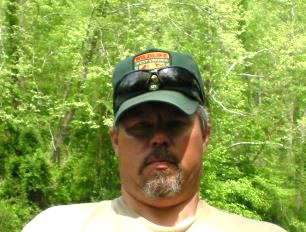 Clifford Brown has worked for West Virginia Division of Natural Resources, Wildlife Resources Section, since 1989 and currently serves in the DNR Environmental Coordination Unit as the lead for oil and gas related activities. Responsibilities include review of Section 401 applications, coordination with WVDEP and USEPA for mitigation and restoration associated with administrative orders and consent decrees, coordination with USFWS related to the National Wildlife Refuge System, Section 7 of the Endangered Species Act, Migratory Bird Treaty Act and the Wildlife and Sport Fish Restoration Program, coordination with the USFS for oil and gas projects on the Monongahela, George Washington and Jefferson National Forests in West Virginia, and serves on the AFWA Energy and Wildlife Policy Committee and the agency coordinator for review of FERC projects in West Virginia. He holds a B.S. in Biology and a M.S. in Wildlife and Fisheries Science from the Pennsylvania State University.
Clifford Brown has worked for West Virginia Division of Natural Resources, Wildlife Resources Section, since 1989 and currently serves in the DNR Environmental Coordination Unit as the lead for oil and gas related activities. Responsibilities include review of Section 401 applications, coordination with WVDEP and USEPA for mitigation and restoration associated with administrative orders and consent decrees, coordination with USFWS related to the National Wildlife Refuge System, Section 7 of the Endangered Species Act, Migratory Bird Treaty Act and the Wildlife and Sport Fish Restoration Program, coordination with the USFS for oil and gas projects on the Monongahela, George Washington and Jefferson National Forests in West Virginia, and serves on the AFWA Energy and Wildlife Policy Committee and the agency coordinator for review of FERC projects in West Virginia. He holds a B.S. in Biology and a M.S. in Wildlife and Fisheries Science from the Pennsylvania State University.
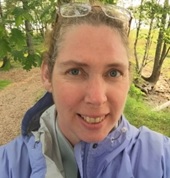 Brenda Zollitsch, PhD is a Policy Analyst at the Association of State Wetland Managers. Brenda conducts research and policy analysis on wetland and stream issues. Brenda has recently completed a national status and trends/state summaries project analyzing 50 state wetland programs across the United States and a national stream identification, delineation and mitigation study, a communications case study project and a wetland training needs assessment and enhancement project. She currently leads projects focused on increasing access to high quality wetland training and improving energy permitting to protect wetlands. In addition to her work for ASWM, Brenda is a Switzer Environmental Fellow, serves as adjunct faculty at the University of Southern Maine teaching courses in public policy and sustainable communities and assists water resource collaborations as a professional facilitator. Brenda holds her PhD in Public Policy from the University of Southern Maine’s Muskie School of Public Service and a double Master’s degree in International Relations and Environmental Resource Management from Boston University.
Brenda Zollitsch, PhD is a Policy Analyst at the Association of State Wetland Managers. Brenda conducts research and policy analysis on wetland and stream issues. Brenda has recently completed a national status and trends/state summaries project analyzing 50 state wetland programs across the United States and a national stream identification, delineation and mitigation study, a communications case study project and a wetland training needs assessment and enhancement project. She currently leads projects focused on increasing access to high quality wetland training and improving energy permitting to protect wetlands. In addition to her work for ASWM, Brenda is a Switzer Environmental Fellow, serves as adjunct faculty at the University of Southern Maine teaching courses in public policy and sustainable communities and assists water resource collaborations as a professional facilitator. Brenda holds her PhD in Public Policy from the University of Southern Maine’s Muskie School of Public Service and a double Master’s degree in International Relations and Environmental Resource Management from Boston University.
View a List of Past Pipeline Permitting Webinar Recordings Here
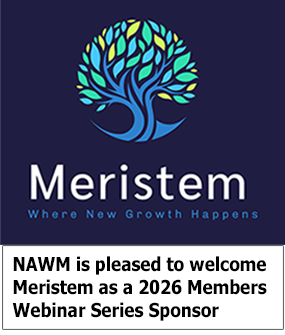 The National Association of Wetland Managers (NAWM) holds eight webinars per year for members. NAWM Member webinars cover a variety of topics encompassing wetland science, policy, program implementation, and legal issues. These webinars, including recordings for past webinars are available to NAWM members.
The National Association of Wetland Managers (NAWM) holds eight webinars per year for members. NAWM Member webinars cover a variety of topics encompassing wetland science, policy, program implementation, and legal issues. These webinars, including recordings for past webinars are available to NAWM members.
Not a NAWM Member? Join or Renew
For more information about this webinar series, please contact Laura Burchill at laura@nawm.org or
(207) 892-3399. Learn more about sponsorship opportunities.
If you haven’t used Teams before or you just need a refresher, please view our guide prior to the webinar.
View Past NAWM Members Webinar Series Here
View a List of Past NAWM Members Webinar Series Recordings Here
![]()
Habitat Benefits of Geographically Isolated Wetlands
Wednesday, March 18, 2026 - 3:00-4:30 p.m. EDT
PRESENTERS
- Lora Smith, Jones Center at Ichauway
- Basile Marteau, University of Helsinki
ABSTRACTS
Lora Smith
Ecosystem services of isolated wetlands in longleaf pine forests: amphibian diversity
Geographically Isolated Wetlands, or GIWs, are often defined as wetlands that lack a consistent surface water connection to other water bodies. Despite the apparent lack of connectivity, GIWs provide ecosystem services that greatly exceed their spatial extent, and are important functional components of the broader landscape. At local scales, GIWs provide critical habitat for wildlife, including threatened and endangered species. At regional scales, GIWs improve water quality by removing sediments and nutrients. GIWs also store large amounts of water, helping buffer watersheds from both floods and droughts. This is particularly important for amphibians in wetlands embedded within native terrestrial systems such as longleaf pine (Pinus palustris) forests, where >30 species of amphibians can occur. More than a third of these species breed exclusively in GIWs including two federally-listed species (reticulated flatwoods salamander, Ambystoma bishopi; frosted flatwoods salamander, A. cingulatum), one species under review for federal listing (gopher frog, Rana capito), and a state-listed threatened species (striped newt, Notophthalmus perstriatus). Their larvae rely on aquatic systems, whereas juveniles and adults spend the non-breeding season in adjacent upland habitats. These species, like other amphibians that breed in GIWs, generally have a long life span, high reproductive potential, and some degree of plasticity in larval development as adaptations for cycles of wetland filling and drying. However, reproductive success is dependent on minimum thresholds of hydroperiod length. Additionally, extended hydroperiods may increase annual reproductive output of species. Therefore, management of wetlands and the surrounding forests to increase wetland hydroperiod is critical to support amphibian diversity.
Basile Marteau
The role of vernal pools and aquatic invertebrates in supporting waterfowl breeding success
The decline of invertivorous waterbirds in Fennoscandia over the recent decades has raised concerns. Decrease in food resource availability and quality has been suggested as one of the potential drivers behind this decline. Fewer wetlands are suitable for dabbling ducks as many shallow lakes and wetlands have been drained for agriculture or forestry, and existing ones are overgrown. In this context, temporary wetlands may be particularly important for rearing ducklings as they might host a high abundance of aquatic invertebrates due to the absence of fish predators. Hence, Vernal pools are small temporary wetlands, usually filled with precipitation in autumn and winter. However, the impact of wetland productivity (in terms of available aquatic invertebrates) and ducklings body condition and survival is still poorly understood, especially in temporary wetlands
In this research, we used imprinted mallard ducklings (Anas platyrhynchos) to study the effects of habitat type (lake, and vernal pools) and their relative aquatic invertebrate availability on duckling growth in 2023 and 2024. Ducklings were divided into two groups and assigned to forage in either lakes or vernal pools. Ducklings foraged at the study sites for four hours daily and were weighed before and after. Aquatic invertebrates were sampled with emergence and activity traps. Ducklings gained as much or more weight when feeding in vernal pools compared to lakes in 2023 and 2024 respectively. Results showed ducklings’ daily weight gain was linked to macroinvertebrate availability. Temporary ponds were richer in aquatic macroinvertebrates than lakes, and more ducklings survived in temporary ponds due to the absence of fish predation. We highlight the crucial role of aquatic invertebrates in ducklings’ mass gain and the under investigated potential importance of temporary wetlands for duckling survival and overall waterbird breeding success.
BIO
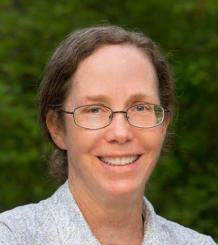 Lora Smith has been a Research Scientist in herpetology at the Jones Center at Ichauway in southwestern Georgia since 2001. Broadly, her research program at the Center has focused on the effects of habitat restoration and management on amphibian and reptiles in longleaf pine forests. Her work includes studies on habitat predictors of amphibians and reptiles in seasonal wetlands, long-term studies of the effects of predators on gopher tortoise populations, and the ecology of upland snakes. She has adjunct faculty status at the University of Georgia and has served on the advisory committees of more than 18 UGA graduate students. Most recently, she was lead author on a book chapter on Conservation of southeastern amphibians for the Amphibian Biology series published by Edition Chimaira Publishers.
Lora Smith has been a Research Scientist in herpetology at the Jones Center at Ichauway in southwestern Georgia since 2001. Broadly, her research program at the Center has focused on the effects of habitat restoration and management on amphibian and reptiles in longleaf pine forests. Her work includes studies on habitat predictors of amphibians and reptiles in seasonal wetlands, long-term studies of the effects of predators on gopher tortoise populations, and the ecology of upland snakes. She has adjunct faculty status at the University of Georgia and has served on the advisory committees of more than 18 UGA graduate students. Most recently, she was lead author on a book chapter on Conservation of southeastern amphibians for the Amphibian Biology series published by Edition Chimaira Publishers.
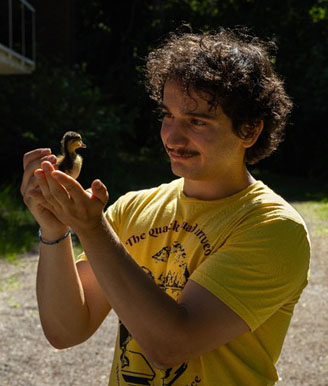 Basile Marteau is a Wetland Ecologist working at the University of Helsinki and the Lammi Biological Station. In his doctoral journey, he is trying to understand how wildlife, waterfowl, bats, and insects can benefit from temporary ponds. He is specifically studying waterfowl breeding success and duckling survival.
Basile Marteau is a Wetland Ecologist working at the University of Helsinki and the Lammi Biological Station. In his doctoral journey, he is trying to understand how wildlife, waterfowl, bats, and insects can benefit from temporary ponds. He is specifically studying waterfowl breeding success and duckling survival.
A Certificate of Attendance to be used toward Continuing Education Credits is available when participating in NAWM's live webinars. All Certificates must be claimed no later than 60 days from the live presentation. Certificates are not available for viewing recorded webinars. More Information.
![]()
To view Past Members Wetland Webinars:
Members You must be logged in.
Nonmembers To view recent Members Webinars, please join NAWM.
View Past Members Webinar Series Here
View a List of Past Members Webinar Series Recordings Here
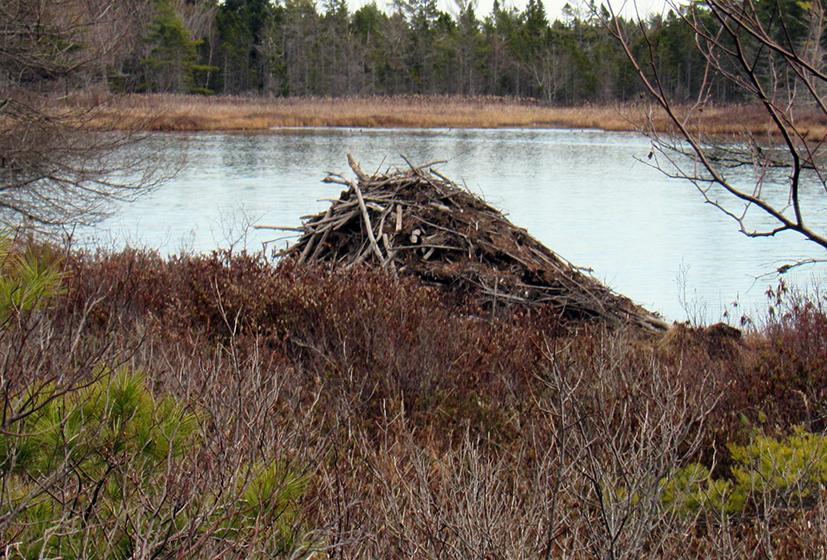 The National Association of Wetland Managers (NAWM) formerly the Association of State Wetland Managers (ASWM), and the Bureau of Land Management (BLM) collaborated to develop a series of webinars introducing the topic of restoration of aquatic ecosystems through the reintroduction of beavers, the use of beaver dam analogues (BDAs) or restoration designed to attract beavers to an area to contribute to changing hydrology and restoring ecosystem services. The webinar series was planned by a national workgroup of beaver restoration experts and webinars are presented by expert practitioners, managers and researchers working in the field. In 2020-2021, the six-part webinar series covered the basics of beaver restoration and continuing through implementation challenges and ways to encourage beaver restoration projects. The series has been added to our Online Trainings library, available here.
The National Association of Wetland Managers (NAWM) formerly the Association of State Wetland Managers (ASWM), and the Bureau of Land Management (BLM) collaborated to develop a series of webinars introducing the topic of restoration of aquatic ecosystems through the reintroduction of beavers, the use of beaver dam analogues (BDAs) or restoration designed to attract beavers to an area to contribute to changing hydrology and restoring ecosystem services. The webinar series was planned by a national workgroup of beaver restoration experts and webinars are presented by expert practitioners, managers and researchers working in the field. In 2020-2021, the six-part webinar series covered the basics of beaver restoration and continuing through implementation challenges and ways to encourage beaver restoration projects. The series has been added to our Online Trainings library, available here.
If you haven’t used Teams before or you just need a refresher, please view our guide prior to the webinar here.
View Past Beaver-related Restoration Webinars

Please check back for future Beaver-related Restoration Webinars.
